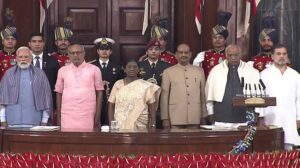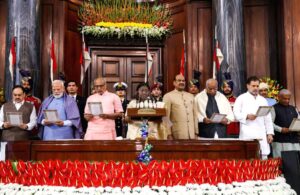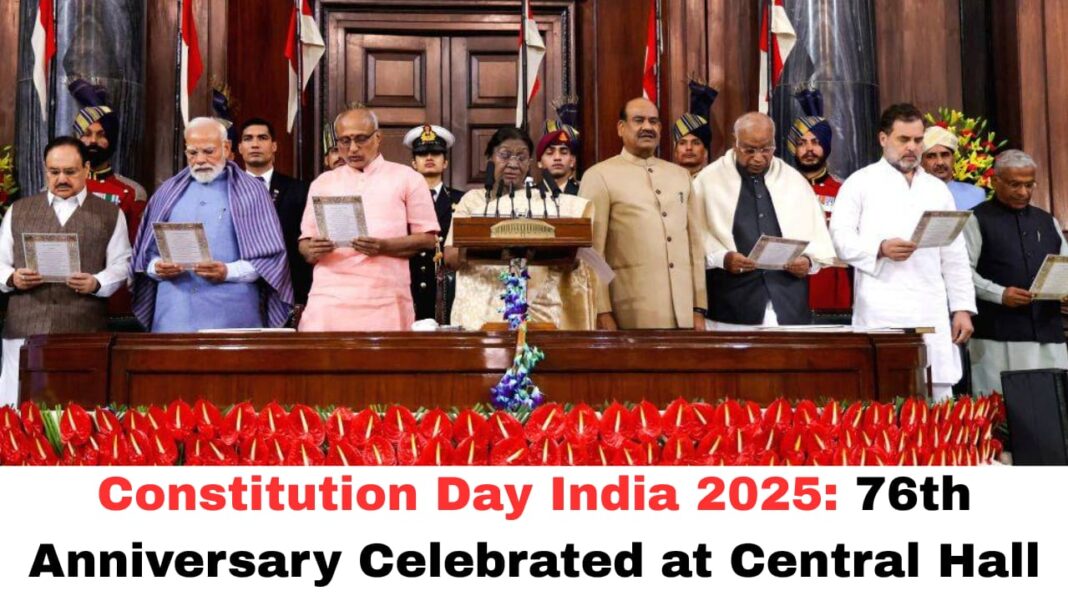Digital News Guru Current Affairs Desk:
India Marks 76 Years of Constitution
On 26 November 1949, the Constitution of India was adopted by the Constituent Assembly of India — an event that laid the foundation for the world’s largest democracy. To honour that defining moment, the nation observes Constitution Day every year on 26 November.
This year, the 76th Constitution Day was celebrated at the historic Samvidhan Sadan (Old Parliament building), where dignitaries gathered in the Central Hall for a solemn ceremony. Leading the event were Droupadi Murmu (President of India) and Narendra Modi (Prime Minister of India), alongside the Vice-President, Speaker of Lok Sabha and many members of Parliament.

“Hamara Samvidhan, Hamara Swabhiman” — Celebrating Constitutional Legacy
This year’s theme, “Hamara Samvidhan, Hamara Swabhiman” (Our Constitution, Our Pride), echoed through the speeches and events of the day.
President Murmu, in her address, reflected on the historic significance of the day: “On this day, November 26, 1949 … the members of the Constituent Assembly completed the task of drafting the Constitution of India.” She reminded the nation that our Constitution was adopted in this very Central Hall, and that every year on this date we collectively reaffirm our respect for the Constitution and its framers.
Murmu emphasized that the ideals enshrined — justice, equality, liberty, dignity — remain as relevant today as they were 76 years ago. She argued that the Constitution remains the guiding document for India’s governance and public life, shaping institutions, rights, duties and the democratic ethos of the land.
Preamble Reading, Inclusive Access and Cultural Remembrance
A key highlight of the ceremony was the collective reading of the Preamble to the Constitution, led by President Murmu. That symbolic act resonated widely — reminding citizens of the founding commitment to democracy, social justice, equality and fraternity.
In a push for inclusivity and broader reach, the government released digital versions of the Constitution in nine additional languages — including Malayalam, Marathi, Nepali, Punjabi, Bodo, Kashmiri, Telugu, Odia and Assamese. This effort aims to make the Constitution more accessible to millions of Indians in their native languages, breaking language barriers and strengthening awareness of fundamental rights and duties among every citizen.
Moreover, a commemorative booklet titled “Art and Calligraphy in India’s Constitution” was unveiled — featuring artistic and calligraphic renditions of key portions of the original handwritten document. This cultural tribute underscores that the Constitution is not only a legal text, but also a piece of national heritage and history.

Civic Duties, Rights — And a Vision of a “Viksit Bharat”
As part of the day’s reflections, Prime Minister Modi reiterated that the Constitution grants rights — but also enshrines duties. In a letter and public messages, he urged citizens to not just demand rights, but to actively fulfil their constitutional duties, contributing to nation-building and social welfare. He said that a vibrant democracy depends on active, responsible citizenry.
Modi paid tribute to the framers of the Constitution, whose vision laid the foundation for India’s democratic institutions. Their foresight, he said, should guide efforts toward realizing a “Viksit Bharat” — a developed India, built on constitutional values, equality, opportunity and dignity for all.
Speakers called upon the youth, students, citizens to internalize the spirit of the Constitution — not just by commemorating its adoption, but by living its ideals daily. Many institutions across the country plan to hold quizzes, essay-writing competitions, exhibitions and public events under the banner of Constitution Day, aiming to deepen public awareness and civic pride.
Why Constitution Day Matters — Then and Now
The adoption of the Constitution in 1949 marked India’s transformation from colonial subjugation to a sovereign democratic republic. The Constitution laid out a framework meant to balance unity and diversity, individual rights and collective welfare, freedom and responsibility.
Today, after more than seven decades, those ideals continue to resonate — but also face new challenges: social inequities, diverse aspirations, and the pressures of rapid change. Celebrating Constitution Day each year serves as a reminder that the Constitution is a living document: one that must constantly guide reforms, protect rights, and anchor the nation’s moral and institutional compass.
By rereading the Preamble, releasing translations in multiple languages, and invoking civic duty, the 2025 celebration reaffirmed a collective commitment — not only to what the Constitution promises, but to what the nation aspires to be.
As President Murmu said: the Constitution remains the foundation of Indian democracy. And as citizens, it is our duty to uphold its spirit: justice, liberty, equality, dignity, fraternity — for ourselves, and for future generations.

Reflections for the Citizenry
On Constitution Day, it becomes more than a formal observance — it becomes an invitation to reflect.
What does the Constitution mean to you, personally? Do you know your rights and duties under it? How can citizens engage meaningfully in protecting democratic values today?
As India strives toward its future, every citizen’s awareness, responsibility, and action matter. This Constitution Day reminds us that the promise of justice and equality is not just in a Preamble, but in everyday deeds.
Let today be a reaffirmation: of the journey we’ve traversed, and the path ahead — guided always by the ideals enshrined in the Constitution.
You May Also Read: PM Modi Hoists “Dharma Dhwaj” at Ayodhya Ram Temple, Marking Historic Completion








